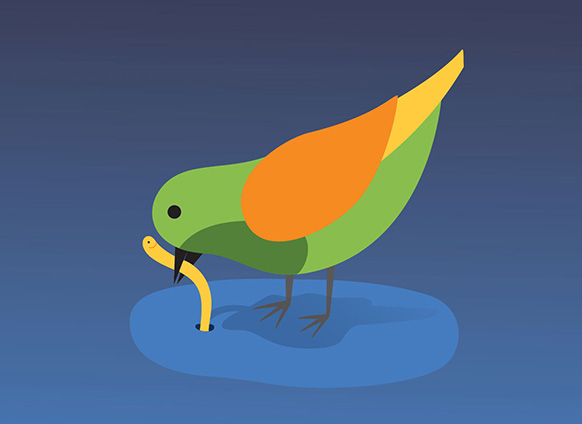I expect I’m going to hate this.
Tomorrow I’m going to start waking up at 4:30 a.m. every day for a month. The goal is, in theory, to become more disciplined in general and do something I’ve always wanted to do but never had the time—to see if Type A early risers and old-fashioned grandparents have been right all along: that the key to success is simply to get started before most people can bear.
Related: 8 Morning Secrets of Highly Successful People
The idea sounded sort of romantic when I first thought about it. Who doesn’t want to check off some life goal? But now I’m worried that, in practice, this will surely screw up my life, and most likely, my wife’s life and my two daughters’ lives.
When I told my wife I was thinking about taking this assignment, she was skeptical of it and the havoc it portended for our household. She seemed poised to ask me to turn it down, which is why I told her in the first place. But I pointed out that I’m a freelance writer, and taking on weird assignments is part of my job. I was hoping for some personal growth, but my choosing to wake up so early would also help pay the bills.
“Let’s get you an alarm clock,” she said.
That melted my skepticism. Which is not to say I’m looking forward to it. The only legitimate reason I can think of to be out of my bed at 4:30 a.m. is that my bed is on fire. But the truth is I’m also a sucker for writing about new experiences. In pursuit of stories, I’ve climbed mountains, jumped out of an airplane, talked my way into the backseat of a P-51 Mustang for a flyover before a NASCAR race and dressed up as Santa (twice). None of those adventures, however, involved choosing to wake up before any sane human otherwise would.
It seems important to point out the extent to which getting up at 4:30 a.m. will change my life. I haven’t had a job that required me to be in the office before 9 a.m. in 17 years. For the past four years, I’ve worked from home, which means I get up whenever I want to, sans alarm clock, usually between 6:30 and 7 a.m. My typical morning routine involves coffee, Bible study and breakfast, and then playing card games with my kids until I go down to my basement office.
My plan on the eve of this grand adventure is to give up none of that but to spend a few hours beforehand doing… well, at the moment I’m not 100 percent sure what. Being miserable is a safe bet. I will also do something, or some things, rather, I’ve never done before. I have two ideas going in. I’ll get to those in a minute. First, I need to set the alarm and get to bed.
Related: 11 Science-Backed Ways to Become a Morning Person
DAY 1
It’s 5:19 a.m., and it’s ever so much worse than I thought it would be. I’m always excited to get up and get going on the first day of an assignment, even this one, so waking up wasn’t too bad. In fact, I woke up on my own at 4:14. I ate breakfast, drank coffee and did my Bible study. (I do that about 60 percent of the time. I’m shooting for 100 percent now that I’ll be up so early.)
Now I’m at the gym, along with three other people whose beds were apparently on fire, and the Creed playing over the speakers is too loud by half, by which I also mean it’s awful that Creed is on at all.
I am here to begin work on the physical part of my “do something you’ve always wanted to do.” I’d say I’m in OK—but not good and certainly not great—shape. I love to hike, and every workout I do is geared toward making my next hike easier.
…the quiet is great, the exhaustion is not, there’s no such thing as too much coffee.
Two years ago, I covered an Army team competition that included a 12-mile hike the participants were required to complete in three hours. That’s 12 consecutive 15-minute miles, which is fast. But I wanted to hike alongside them because I thought a scene at, say, Mile 8 of Pfc Johnny-on-the-spot yacking his guts out, wiping vomit from his mouth and then resuming the hike would be awesome. It was approximately 897 degrees out, and that was the second day of grueling physical tasks, so I was reasonably confident vomiting would happen. After a mile or so, though, I had to give up. I couldn’t keep up.
It was the only time I’ve ever had to bail on part of an assignment because I was physically incapable of doing it. I still filed a story, because the hike was one small part of a three-day event, but it has bugged me ever since.
The Army requires soldiers to complete the 12-mile hike in three hours while carrying rucksacks that weigh 35 pounds or more. Frankly, that’s too much. (My wife would not appreciate me getting up miserably early and hurting myself for the same assignment.) My goal is to get in good enough shape to hike 12 miles in three hours while carrying my backpack full of my camping gear—25 pounds, give or take.
That’s why, when I should still be asleep, I’m suffering through this terribly loud Creed song.
DAY 2
Simply doing a fast hike would not make getting up early every day for a month worth it. I also set a professional goal, which I break down like this:
Step 1. Decide if I want to write a book.
Step 2. If I decide I do want to write a book, decide what it would be about.
Step 3. If I decide what the book would be about, start writing a proposal for it.
I’ve thought about writing a book a lot over the years, especially since I moved from the frenzied fact-gathering of the daily newspaper world into the nuanced storytelling of magazine writing. The excuse I always use for why I haven’t written one is that I don’t have the time. I’ve got a full-time job already, and writing books is a separate full-time job. Which means Step 1 is not a given. And time isn’t the only reason.
Money is a factor, too. To write a book, I first have to write a book proposal, which could take months, with no guarantee it will sell. I am the sole breadwinner in my family, and I can’t afford to work on something that might not yield a paycheck.
One other thing. My excuses—I don’t have time! I can’t afford it!—are not the whole truth. I’m also afraid to write a book. I’m afraid I’m not good enough. I’m afraid I won’t find a publisher who wants to buy my book, and that even if I did, that publisher won’t find anybody who wants to read it. I’m afraid I don’t have the attention span necessary to spend that much time on one project. I’m afraid I’ll turn in the manuscript to some editor in New York, and his derisive laugh at my incompetence will be so loud I’ll hear it over the Creed at the gym.
DAY 6
Other things I’m afraid of: running out of magazine story ideas and the magazine industry going kerflooey. Having books to fall back on or replace magazine work would be nice.
I realize in these early morning brainstorming sessions that I have been thinking about this as a binary decision—books or magazines. But it doesn’t have to be that way. I can write half and half. Yes, the proposal dilemma remains. But so does the daunting prospect of writing one magazine story at a time for the rest of my life. I decide I want to try to write a book.
The next step is to decide what that book will be about. Just thinking about it stresses me out. I’ve long assumed, almost subconsciously, that if I wrote a book, it would be a sports biography or sports history. I wrote for a national sports magazine for 13 years; if I’m known for anything in this business, it’s sports features. But I’ve always considered myself subject-agnostic—I’d be just as happy writing about chefs and artists and musicians.
I spend hours looking for ideas. I half-talk myself into writing a book about the Disco Demolition, the infamous Chicago White Sox promotional stunt in 1979 in which disco records were blown up in between games of a doubleheader, and it was such a fiasco that the second game was canceled. I go so far as to check whether anybody else has done a book on it (no), and whether the key players involved are still alive (yes), and if I could find them, whether they’d talk to me (maybe). (It isn’t until this piece is fact-checked that I learned there has been a book about it, which only proves my point about the perils of creating book proposals. If I had found that book, I would have saved myself hours.)
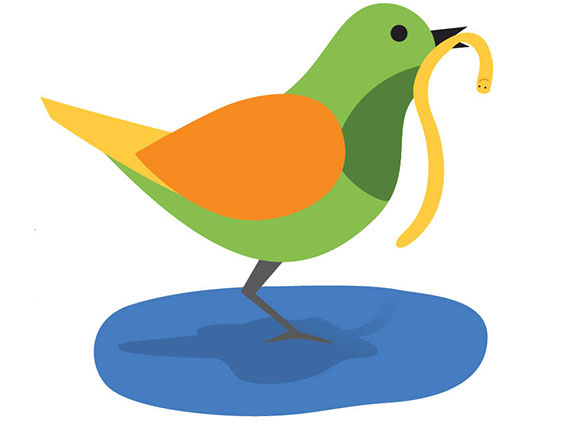
Before I take any formal steps, I come to a conclusion so crystal clear that it’s almost audible: I don’t want to write a sports book. So I’m not going to. I didn’t realize that was a weight on my shoulders until I removed it. I feel like the owner of a bad restaurant who suddenly realizes he can eat wherever he wants. All of these ideas hit me, one after the other as I sit at my dining room table. (In the first few days, I realized that if I sat on the couch, I’d probably fall asleep, so I have been sitting in uncomfortable chairs.)
A few days in and I’m slowly acclimating to my new schedule. The getting up part remains surprisingly easy. The exercise has been invigorating. Midday hits me like a Mack truck plowing into a water barrel, but I hope I’ll adjust to that. My wife hasn’t uttered a peep, but I know in the way married couples know without having to talk about it that the fact I’m not helping with the dishes because I’m asleep will get old soon.
At 4:30 a.m., I cautiously unshackle myself from the pressure to produce. I find myself exploring ideas, turning them over, examining them from every angle.
DAY 8
I’ve avoided surfing online during this free time because next thing you know: cat videos. But I want to research “how to write a book”—in case I ever actually, you know, pick a topic—and I land on Twitter scrolling through #5amwritersclub tweets. I email a bunch of writers who have used that hashtag to ask whether their experiences getting up before the birds line up with mine: the quiet is great, the exhaustion is not, there’s no such thing as too much coffee.
They do.
One key, I glean from them, is the importance of routine, and I’ve settled into mine: Every other day I hit the gym and then spend an hour on the book project. On the non-gym days, I work solely on the book project in the morning. And by working on, I still mean thinking about. I’m no closer to making up my mind. I had no idea—no idea in the world—how much I would enjoy a project in which, so far, I have accomplished essentially nothing. I don’t want to decide what to write about because I’m enjoying trying to decide. The free time in the morning has given me a sense of freedom.
As an independent writer, I’ve been a small-business owner for four years, and the pressure to always be working toward making something is suffocating. One of my business mentors preaches to me constantly about the importance of working on the business and not just in it. I hear his words and understand them and almost never apply them.
The pressure to be productive colors every decision I make. It is, by far, the worst part about owning my own business. As true as that is, so is this: The pressure is inseparable from my success.
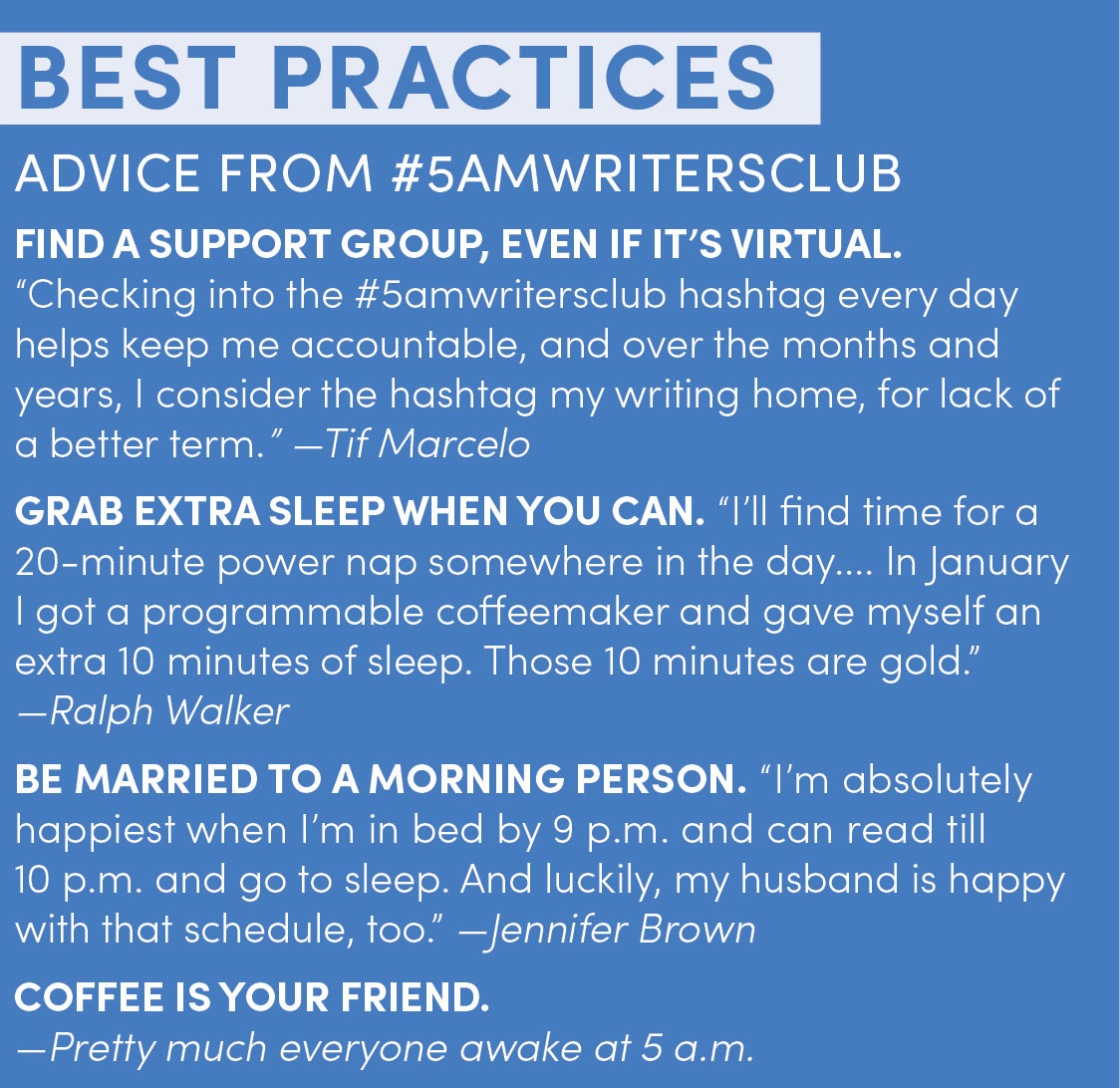
The fear of my wife and kids starving to death because I ran out of work drives me to pitch more stories, to make that extra phone call, to say yes to get-up-at-4:30 a.m.-every-day-for-a-month assignments. The neverending-ness of the pressure and the fear lurking behind it ravages me.
But now at 4:30 a.m., I cautiously unshackle myself from the pressure to produce. I find myself exploring ideas, turning them over, examining them from every angle. I set them down when it’s time to start my “real” day and pick them up again the next day. I start to look forward to my alone time at 4:30 a.m.
I feel refreshed mentally like no other time in years.
Related: 9 Easy Ways to Stay Mentally Sharp
DAY 9
Screw all of those things you just read. This is terrible. The dread of that alarm means my sleep is restless, and I often wake up before my phone starts chirping. I’m exhausted, all day, every day, and have been for what feels like months. (Or years or weeks or days, or however long it’s been. I’ve lost track.) I’m living in the future. At 10 a.m. I want to eat lunch, at 4 p.m. I want to eat dinner, and at 6 p.m. I start thinking about crawling into bed. So far I’ve stayed up beyond 9 p.m. exactly three times, and even with those early bedtimes, I often feel like a frazzled pile of goo.
DAY 11
It’s the morning after the Super Bowl, which, as you might recall, featured the greatest comeback in Super Bowl history. I went to bed in the middle of it.
I’ve started to re-examine how I spend time, and I have found my habits appalling. I waste a lot of time on stuff I don’t care about. I chose to go to bed during the game—with the Falcons up by two scores but the Patriots making a game of it—to try to teach myself to stop that. I don’t care about the Falcons or the Patriots or even football, so I decided not to spend my time on them.
Now it’s early the next morning, the biggest sports news morning of the year, and I’m not going to read any stories about the game and I’m not going to watch any highlights.
This reinforces a thought I have been tinkering with since Day 4 or so, an idea that has been on the margins of my consciousness but I haven’t been able to put into words: I don’t need to get up at 4:30 a.m. to find time to do something that I always wanted to do but never had time for. I can find that time whenever I want if I stop wasting time the rest of the day.
That is, of course, easier said than done. But I have found my early bird mornings provide good practice. I leave my phone off, not that anybody’s going to call at that time anyway. There are no emails to read, no reason to check Facebook and only #5amwritersclub on Twitter to scroll through. I can turn off all of those things and recreate the solitude of 4:30 a.m. anytime I want.
If this straining of the bad time habits of my life continues—I can already see that this is going to be an ongoing process that will last far longer than a month—I will consider this experiment a success, based just on that alone.
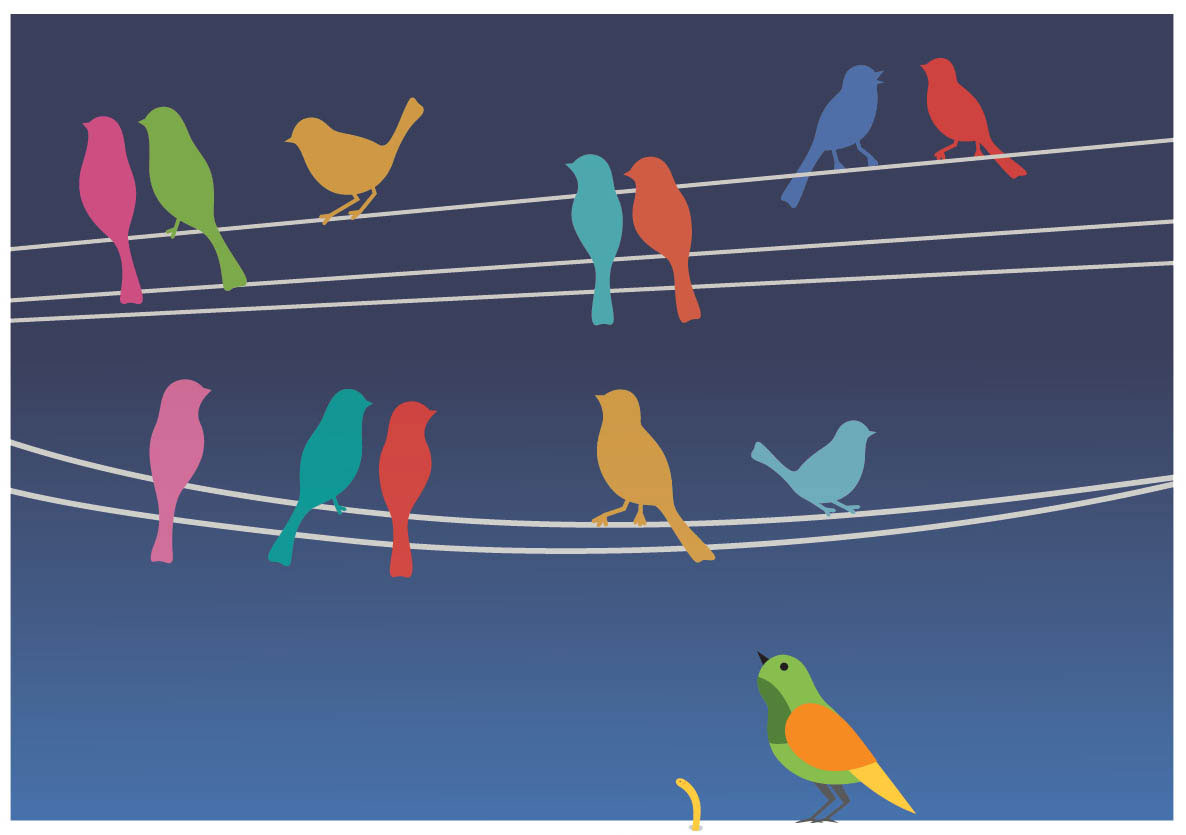
DAY 15
I think I know what the book is going to be about. I came up with three ideas, all fiction, that I thought I’d be able to pull off and chose the one I guessed would be the best combination of doable and sellable. I’ve started writing it, but I don’t want to say what it is until I’m sure I’m going to at least try to finish it.
DAY 18
For the first time, I sleep straight through until the alarm on my phone rings. I am in Fairbanks, Alaska, on assignment, and in the two previous nights I slept three hours and five hours. Exhaustion doesn’t describe this level of tired. But the sleep feels like an accomplishment, like the difference between when my daughter first wobbled the length of our front yard on her bike and when she rode it all the way down the street. Getting up early has finally become normal. I am surprised it took this long.
DAY 20
I realized pretty early on that my plan to wake up early every day including weekends with no days off and no naps, has a number of flaws. If a “real” person was doing this and got exhausted, he or she would take a day off. (My #5amwritersclub correspondents agree.) Now, most days, my bed calls me like honey calls a bear.
I have had a chest cold, a head cold, a low-grade fever, an ear infection and a gnarly gastrointestinal reaction to the medicine I took. I haven’t exercised in almost two weeks, and my hiking goal is in serious peril. I had planned to try a 12-miler on the final day of this experiment, but I have all but given up on that.
I chalk the sicknesses up to the fact my kids are petri dishes in sparkly T-shirts and not the fact I’ve completely changed my sleep-wake cycle. But in the 10 years I’ve had kids and didn’t get up at 4:30 every day, I’ve never been sick for this long.
I have to get eight hours of sleep, and I’m skeptical of people who say they get by on less. In order to be able to get up at 4:30 and be a functioning human, I’ve gone to bed at 8:30 p.m. almost every night, which means my wife and I haven’t spent as much time alone together as I’d like, by which I mean exactly what you think I mean.
Related: 61 Interesting Facts You Never Knew About Sleep
Before this started, I read The Last Battle from The Chronicles of Narnia out loud to my kids at bedtime. I’m going to bed before they do now, so reading time is temporarily on hold. On the other hand, starting work at 4:30 a.m. allows me more free time during the day, and we’ve filled an entire legal pad with scores from card games.
I realized pretty early on that my plan to wake up early every day including weekends with no days off and no naps, has a number of flaws.
DAY 22
Fine, I’ll tell you what the book is about, now that I’ve written half a dozen chapters.
When my now 10-year-old daughter was about 3, she came home one day and told my wife and me that a girl named Beverly Quarter had pushed her down at the park. We heard several more stories about Beverly Quarter—our daughter always said both names, and she said them so quickly it sounded like one: Beverlyquarter—and eventually we figured out Beverly Quarter was her invisible friend.
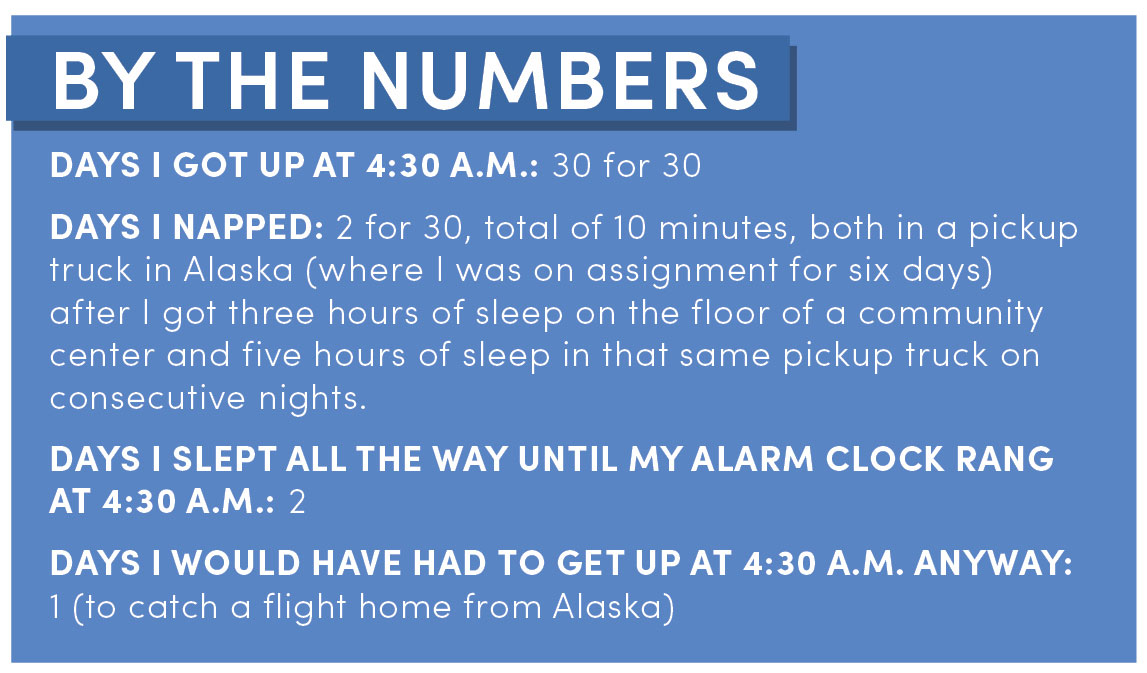
Only Beverly Quarter wasn’t much of a friend. Beverly Quarter was mean. I started calling Beverly Quarter her invisible frenemy, and from the first time those words came out of my mouth, I thought, “Beverly Quarter: Invisible Frenemy would make a great book title.”
I don’t know exactly what the book is going to be about, except that it will cover the adventures of a girl who very much resembles my older daughter and her invisible friend who constantly gets her in trouble. Maybe the entire plot will revolve around the hijinks that ensue when the protagonist’s dad gets up early every day for a month.
DAY 23
Beverly Quarter is hilarious.
This book is hilarious.
I’m hilarious.
DAY 24
Nobody in a million years will want to read this book, never mind buy it.
DAY 25
I had no idea I would be such a great children’s book novelist.
DAY 26
I have written 10,000-plus words, enough for half a kids’ novel, with the only problem being they are all gibberish.
DAY 28
I jolt awake in a panic, sure it’s 6 a.m. and I’ve overslept—so close to the end and I blow it. Why didn’t my alarm go off? I check the clock. It’s actually only 12:30 a.m. I can physically feel my body begging me to sleep more.
I don’t need to get up at 4:30 a.m. to find time to do something that I always wanted to do but never had time for. I can find that time whenever I want if I stop wasting time the rest of the day.

DAY 29
One morning left, and I’m ready for this to be over. I’m still sick. I was up half the night coughing. Based on the fact a couple of my friends are doctors, I’ve diagnosed this assignment as approximately 50 percent responsible for the nearly three weeks I’ve been ill. The hiking goal is officially abandoned.
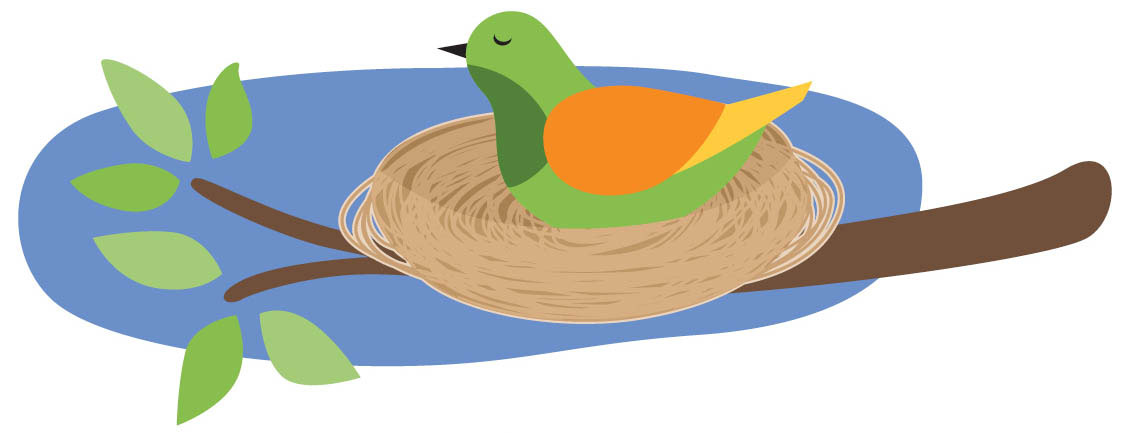
I try to write one of the most important chapters of Beverly Quarter: Invisible Frenemy, and to call it a slow slog would be an insult to slow slogs. It contains, or will contain if I ever actually finish writing it, a scene I’ve been thinking about since the day I decided to write the book.
It has to be hilarious. I know what I want it to say, how I want it to feel, but I can’t get myself to write it in a way that isn’t atrociously bad. I force it for a few minutes and then give up.
I close the file and turn on the replay of a NASCAR race I wanted to watch last night but that started after I went to bed. (I love writing about NASCAR, and if anybody bought NASCAR books, I’d write those.)
As the cars drive around in circles, it occurs to me that my daily work drudgery is exactly like that. The same thing over and over and over again, ad infinitum.
Not this month. My 4:30 a.m. time still feels fresh. But there’s a big question, one I’ve been wondering about for two weeks, one for which I don’t have a fully developed answer: How do I translate the benefits of my 4:30 experience into my normal workday without all the other disruptions to my family time?
I have to at least try, and the only thing left to decide is how to organize it. I hope to block off that time as sacrosanct and maybe even leave my basement for it. It’s an open question whether I have the discipline to do that on anything close to a regular basis. Creating a new habit, especially one out of which I might not get much tangible benefit, could prove difficult.
Then again, I found the discipline to get up at 4:30 every morning for a month when I didn’t want to. Maybe I should just keep—yeah, right. No way in heck am I doing that.
I’m sleeping in tomorrow.
Related: What the Most Successful People Do Before Breakfast
This article originally appeared in the June 2017 issue of SUCCESS magazine.



